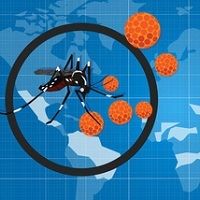Nearly 200 US Pregnant Women Confirmed with Zika
THough the absolute numbers are small compared to the thousands tested, the CDC reports that over a two-month period ending in early March, 189 pregnant US women tested for Zika were positive for infection. Of those, seven had no symptoms of illness.

Nearly 200 pregnant women in the US were infected with the Zika virus, the mosquito-borne flavivirus now confirmed to cause microcephaly in infants. The numbers could be higher since they represent only women who sought testing.
Those numbers include seven women who had no symptoms of being infected.
The statistics were part of a US Centers for Disease Control and Prevention (CDC) study released April 15 in the agency’s Morbidity and Mortality Weekly Report.
According to lead author Sharoda Dasgupta, PhD, the absolute numbers are small, with positive results for 182 pregnant women of 3,335 who were tested and of whom 1,541 had symptoms of infection. Of 2,425 pregnant women who had no symptoms, seven were pregnant.
The CDC has been recommending Zika testing for pregnant women since Feb. 12, 2016.
“Given the potential for adverse pregnancy and infant outcomes associated with Zika virus infection, health care providers should continue to offer Zika virus testing to asumptomatic pregnant women with potential exposure,” Dasgupta and colleagues wrote.
The cases are all believed to be in women who were exposed by traveling to an area where Zika is endemic.
So far there are no endemic zika areas in the continental US, but Florida could potentially become one since mosquitoes live there year-round.
Though some physicians had been skeptical that there was more than an association between exposure to the virus and microcephaly in newborns, last week the CDC, citing a study in the New England Journal of Medicine, confirmed that the birth anomaly is caused by the infection.
The CDC report had no information on whether the pregnant women had decided to continue their pregnancies or if any had resulted in miscarriages--which sometimes occur because of the infection..
Microcephaly is diagnosed by ultrasound and generally cannot be detected until the end of the second trimester.